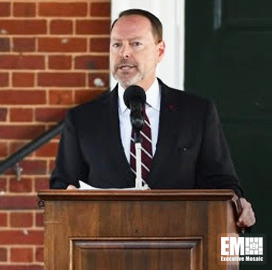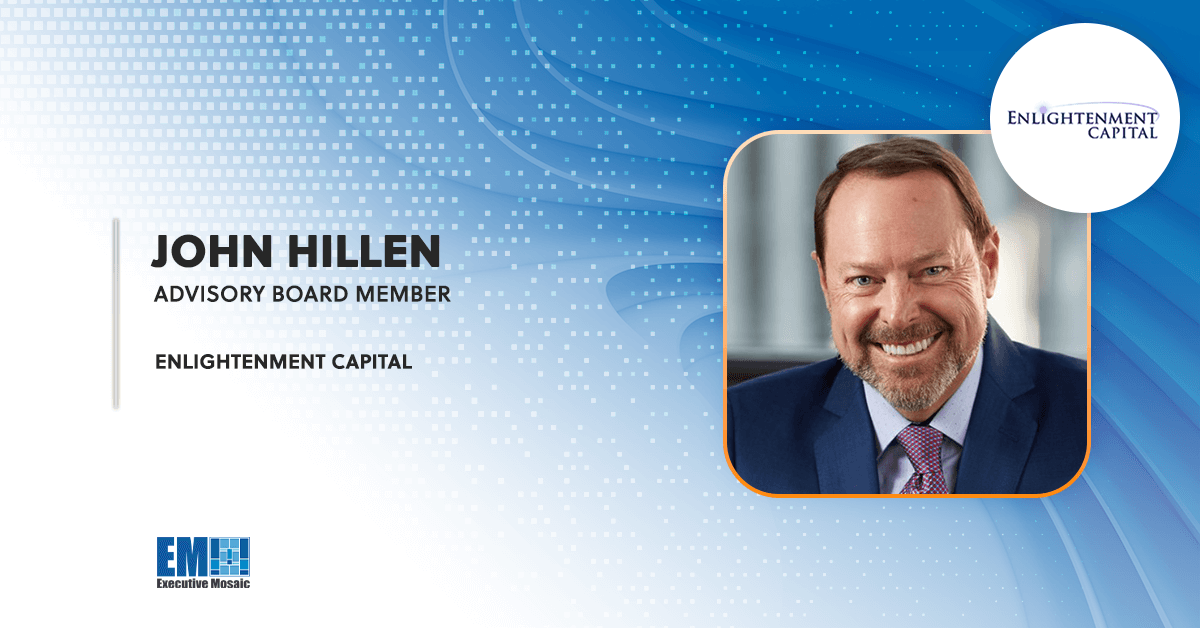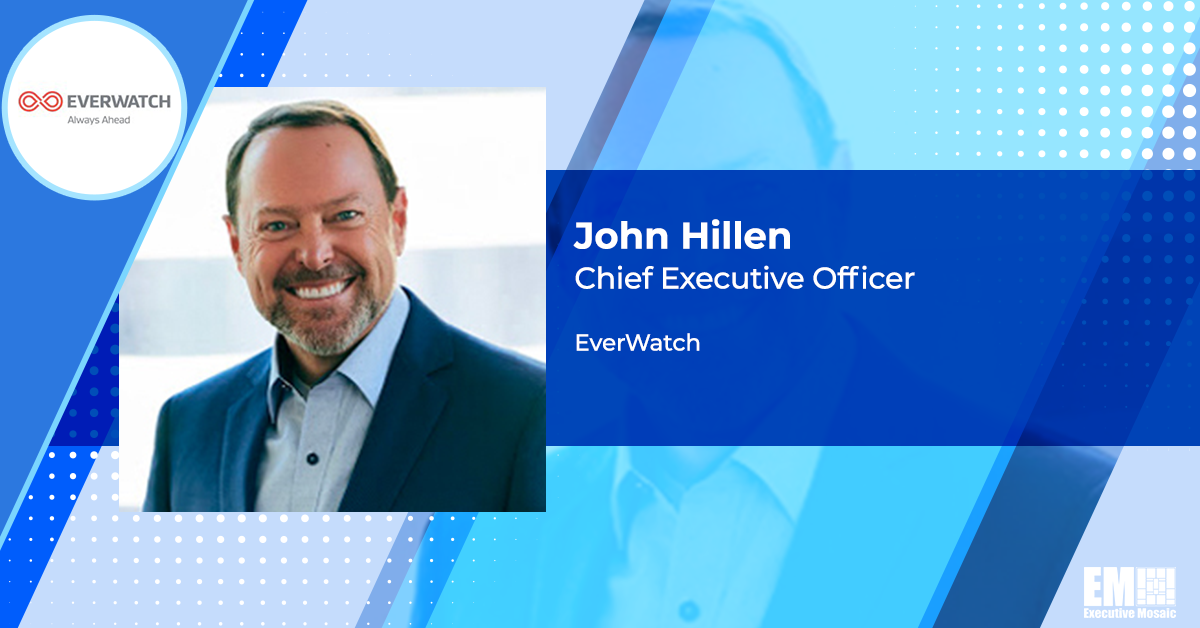GovConWire had the chance to interview longtime industry veteran Hon. John Hillen, CEO of EverWatch Solutions and a previous Wash100 Award recipient, about the upcoming presidential election and the government contracting (GovCon) industry. Dr. Hillen is a former Assistant Secretary of State and former Chairman of the Professional Services Council (PSC).
He was one of the founders of the Center for Government Contracting at George Mason University’s School of Business and is the Chairman of the Center’s Advisory Board. He has been a member of the Council on Foreign Relations for 25 years and has published several books and dozens of articles in The NY Times, Wall Street Journal, The Washington Post, Foreign Affairs, and elsewhere on Presidencies and national security policy.
Dr. Hillen provided GovConWire his thoughts on the key differences between the way the candidates think about American foreign policy and national security priorities, and some of the implications or ramifications for the GovCon industry.
Hillen’s bottom line? The candidates have far more in common on defense policy and priorities than one might think. And, macro trends that exist somewhat outside changes of Presidential administration will make more of a difference in the end for shaping the industry.
GovConWire: You’ve been a foreign policy and defense advisor, speechwriter, and debate prepper on several Presidential campaigns in the past. How large a role do you think foreign policy differences between the two candidates might play in this election?
Hillen: “We know for a fact from polling that this is not an election in which major foreign policy issues or the differing worldviews of the candidates are looming large in the minds of voters. Where these issues do creep into the top ten, it is about foreign policy issues that have a direct impact on the homeland—such as terrorist attacks in the United States or immigration policy.
It has been this way in recent times, and except for the election of 2004, when we were in the midst of the George W. Bush response to terrorism in Iraq, Afghanistan, and around the globe, foreign policy has not loomed large in elections since 1988. But every presidency ends up becoming a foreign policy presidency whether it was a foreign policy election or not. Events happen. Black Hawks down in Mogadishu, genocide in Rwanda, spreading civil war in the Balkans, terrorist attacks at home and abroad, great power rivals expanding with impunity into adjacent territories, ISIS executing journalists and aid workers on the evening news, rogue states threatening nuclear ambitions, and on and on.
Let me give you an example. In the 2000 campaign, on the George W. Bush team we were very active in crafting a foreign policy and national security vision for the relatively inexperienced Governor of Texas against his very experienced opponent. But, In the end, the issues we toiled and fought over were not influential in the election, and we wound up, just like Barack Obama and Donald Trump after him, with an initial presidential agenda that focused on domestic renewal and policy, not foreign affairs.
That is, until events happened. A President quite convinced that his first-term legacy would be the No Child Left Behind Act was in fact reading to school children in a Florida classroom when the first plane struck the World Trade Center on September 11, 2001. And the world, and his presidency, completely changed.
We have not really had a presidential candidate, who then took office, who had a thoroughly formed worldview and/or deep foreign policy experience since George H.W. Bush in 1988. Every president since then, in many ways, has had to form his views and learn on the job.”
GovConWire: Before we get to the details of how the two candidate’s foreign policies and national security priorities might affect the GovCon community, what should we take away from their differences just as citizens and voters when it comes to foreign policy?


Hillen: “Well, at the level of their general philosophy about American foreign policy, I think that the more interesting and bigger difference in worldviews and foreign policy is NOT between Donald Trump and Joseph Biden; but rather is between Trump and a broad consensus about America’s role and the international community that has persisted in some recognizable form since the end of World War II and has been fading since 2009. As I heard Richard Haass, President of the Council on Foreign Relations, say recently, for the most part over the past 70 years, presidents have played the game between the 40-yard lines—to use a football analogy.
Now, there have been very fierce disagreements and divides over the major foreign policy issues of the past 70 years, so perhaps we should expand that thought to between the 30-yard lines. But I do think Dr. Haass’s point holds up. Underneath the many disagreements between parties or presidents about tactics, modalities, approaches, locales, and end states of various foreign policy challenges, there has been a broad consensus on several fundamental issues about American leadership in international institutions, about American military presences and security guarantees, about championing human rights, liberal democracies, and economic freedom.
All that has been deteriorating over the past decade plus. While President Obama implicitly challenged that consensus with notions such as “leading from behind” and “focusing on nation building here at home,” Candidate Trump came into office with a more forceful rejection of the American role consensus. He pointed out to the American public that the assumptions behind the old foreign policy consensus were all being called into question by outcomes, and he would vigorously re-examine and challenge them.
And President Trump held to his promises. On trade, he has broken with a decades-long bipartisan consensus around free trade that has seemed to leave whole constituencies out of its benefits and fuel the rise of competitive states—at our expense in his mind. He has been more skeptical than even hardline Republicans of the past about international organizations, treaty arrangements, alliances, arms control agreements, and diplomacy in general.
While his opponents—I think fixated on his tone and style—have criticized his tough tone, for his part, President Trump has claimed to be the peace president and has taken an even more aggressive stance than President Obama (who came to national attention largely as an anti-war candidate) about reducing U.S. troop presence and security guarantees in the Middle East and Afghanistan—and even Europe. And President Trump has asked far more explicitly than administrations past for allies to pick up more of their share of the cost for the enduring U.S. presences overseas.
On the human rights front, presidents as different as Jimmy Carter and Ronald Reagan embraced in their own way what might be called “the freedom agenda”—a central tenet of American policy since the beginning of the Cold War even if subjected to very different tactics by various presidents. President Trump has not shown enthusiasm for this—although it is possible he could find his own way of expressing this long-standing pillar of American policy. And finally, he shuffled the deck on the traditional treatment of allies and adversaries, sometimes seeming to apply more pressure to the former than the latter.
None of this is to say that his foreign policy has been wrong, bad, or unsuccessful. It’s simply to note his break with consensus. On some issues, his very willingness to break with a consensus has sort of unclogged some clogged pipes—and produced results that seemed suspended by the consensus approach. He correctly read not only the mood of much of the American public in 2016 about populist and nationalist themes, but he also was aided by the simple observation that this American-led liberal convergence agenda was not producing the results its architects had promised over the years.
Compared to the 65 years after the end of World War II, when it comes to international leadership and American dominated international institutions, America has been retrenching since 2009. I heard one wag say that Trump’s foreign policy was just Obama’s with rougher manners – which is not entirely fair, but also not without a basis in reality either. Both the Obama and Trump administrations have pulled back from muscular US leadership through international institutions and on extended military deployments.”
GovConWire: But wouldn’t a Biden administration want to reverse that trend line?
Hillen: “Yes, very much so at one level. But, it will also be difficult for Vice President Biden to return to that consensus foreign policy worldview if he is elected—even if that is his inclination—and I think it is. The events and outcomes that in part caused President Trump to veer off the conventional foreign policy path are well in place, and this world will not be put back into a bottle designed in 1950 or 1990.
Today’s global arena challenges just about all of the premises of the foreign policy consensus I outlined above, from trade to defense, but let me give you just one example here with China. Both parties have maintained since the opening of China in the late 1970s to this American-built and American-dominated international system that the effect of open economic systems and the resultant progress and prosperity would liberalize China in many ways. Bring them into the system as a partner—or, at least, as a “responsible stakeholder” in the words of my former boss Robert Zoellick, former Deputy Secretary of State, U.S. Trade Representative, and President of the World Bank. But it turns out that China is not only not likely to liberalize its political systems, but it also is increasingly aggressive in applying its more totalitarian approach to the areas around it—from Hong Kong to the Uyghurs in Western China.
China is expanding its military presence in disputed territories to international outcry, building an energy system that will make a mockery of any climate change accord the well-behaved nations of the world might sign with each other, and continues to be the chief trading partner against whom everyone in the World Trade Organization wants to file a dispute. China is wealthy, powerful, and ambitious as a result of being pulled and invited into the post-WWII international system, and the Chinese Communist Party is not going anywhere. In the end, I strongly suspect that they will not want to be a “responsible stakeholder” in any system that they did not construct and cannot control.
So, even a President Biden, who is thoroughly conventional because of his 40+ year involvement in foreign policy as a Senator and Vice President, will have to carve out his own ways of being different from the old consensus.
In particular, the progressive critique of consensus foreign policy does not share his conventional Democratic realist belief that the world’s nation-states are ultimately on track to converge around liberal democratic norms and that American power should underpin this trajectory. Instead, progressives look out at the world that neoliberal economic ideas have produced as being one that has heightened inequality, spurred not-free but rather authoritarian capitalist states, threatened the environment, and made social and racial justice more difficult to achieve around the globe. They will demand from a President Biden specific policies and philosophies that put these concerns at the forefront of American foreign policy goals rather than his version of traditional Democratic Party realism.
So, it would be hard for either candidate to return to conventionality. One does not want to anyway, and the other very much might want to, but in both cases that toothpaste of reality cannot be put back into the tube. And those realities were accelerated by the last two administrations’ rather diffident attitude towards American leadership.”
GovConWire: What would be the major differences in their specific approaches to foreign policies and priorities?
Hillen: “In my judgment, the biggest differences will stem from their contrasting belief in international cooperation in general, and multinational institutions as effective venues for advancing American policy goals. President Trump pulled out of the Paris Climate Accords, the Joint Comprehensive Plan of Action (Iran nuclear deal), and the World Health Organization. Former Vice President Biden has said he will reverse all that and more. As a rule, a President Biden will be more interested in participating in, leading, and investing in international organizations and working much of U.S. foreign policy through and with them.


The candidates have very different views on arms control and proliferation—not so much in the outcomes, but rather in the methods. Here again, President Trump would be much more unilateral in orientation (but not entirely) and a President Biden more likely to work arms control in the conventional way—led by technocratic experts and characterized by complex international negotiations and oversight regimes.
Joe Biden has made much of “re-building” the State Department and placing more of an emphasis on diplomacy. For his part, President Trump has been non-plussed about empty senior positions and reported low morale at State, saying to one interviewer that when it comes to foreign policy, “I am the only one that matters.” So, that is a big difference in philosophy and approach although I think it emerges less dramatically on the ground with policy outcomes than it might appear.
As I alluded to, clearly on allies and alliances, the candidates are very different in tone, perhaps a little less so in substance. On trade, Vice President Biden very much came up in the free-trading tradition of the foreign policy consensus, but will be challenged by reality and his own party to offer trade policies that seem to more emphatically favor Democratic Party constituencies and progressive priorities — so that is an interesting area to watch. And, in the meantime, one could wonder if a free trade constituency could ever re-emerge in a politically relevant way.”
GovConWire: What about national security?
Hillen: “I think that in terms of defense policy and national security priorities, the candidates are far more alike than different. They have both promised to attend to so-called great power rivalries and be tough on China and Russia. So, the swing of our strategic pendulum from the global war on terrorism to great power rivalry will continue in either a Trump or Biden administration and you can surmise the kinds of systems and funding that will follow that strategic priority.
Both candidates promise to be tough on so-called rogue states such as Iran and North Korea, but their approaches might be very different—as evidenced by their different ideas about the Iran nuclear deal.
Both candidates promise a robust level of defense spending (no reductions in the first years), and the differences in their stated defense priorities are not significant. In the past, we would often have one candidate who was backing this kind of military or set of systems versus a candidate who favors different systems and strategies. Not so this time.
Interestingly, from my perspective, both candidates share a more dovish attitude towards American military deployments, particularly in difficult areas or on missions that do not seem to promise a quick return. They even have used similar language about deployments and missions in the Middle East and Afghanistan. One will end the “forever wars,” and the other will conclude the “endless wars.”
So, that is the one area where I see some potential downside for the national security industry – the support and enablement of large troop deployments in the Middle East and Afghanistan. But, on the other hand – these places are still critical to the US national security interest so I think there will be a renewed premium on low-footprint/high-impact intelligence-heavy “presence” models. Those will be increasingly high tech in nature as we seek to substitute technology for people in the missions.”
GovConWire: How much of the GovCon industry might be insulated from any change in administration?
Hillen: “There are a number of macro-trends that I think insulate many GovCon technology services providers from the ups and downs of administration changes and politics.
First, the changes in technology and the government’s need for it to fuel their missions and make their outcomes more efficient and effective is a trend that rises above administrations and elections. The Federal IT Budget has steadily grown and especially the FedCiv side of the budget. But, so too on the defense and intel side. We all know the buzzwords – AI, Machine Learning, Cyber, Big Data, etc, etc. But…they are buzzwords because they are real – or represent real spending and mission priorities. So that moves forward under any administration – and the technical potential gets ever greater.
Another macro trend that should give technology contractors solace is workforce trends in the overall government technology workforce. We are staring at a demographic wave of senior federal management retirements in the next decade, and this is especially pronounced in the technology and acquisition workforce among senior federal managers. The trend means that technology projects and programs are often now staffed 20:1 or even more in terms of contractors: feds. At every level, from solution development to program management to implementation, the reliance on highly skilled technology contractors will grow.
These and others are long-term trends. The last time the GovCon industry hit a big downturn was in the early 90’s when the immediate post-Cold War defense budget fell off a cliff in terms of spending. But since 9/11, the combination of vigorous government spending, technology potential, and flexible workforce management in government programs has had the industry steadily advancing regardless of who is President. That can always change, but I see very much an atmosphere of general continuity at this point.”








